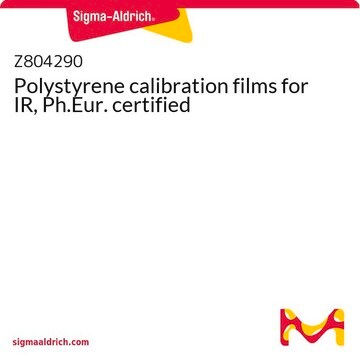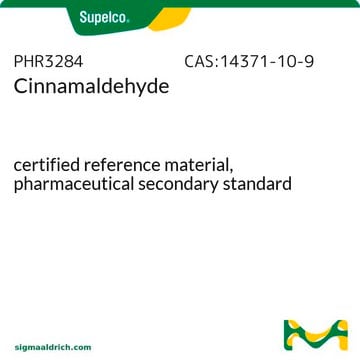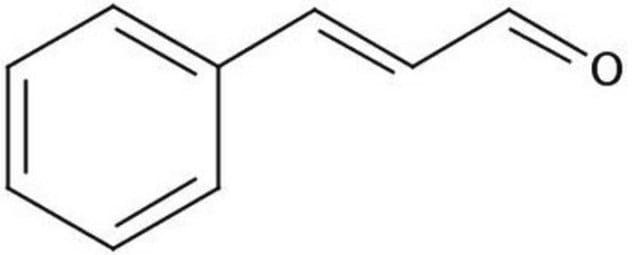W228605
trans-Cinnamaldehyde
FCC, FG
Synonym(s):
(E)-Cinnamaldehyde, Cinnamic aldehyde, trans-3-Phenyl-2-propenal
About This Item
Recommended Products
biological source
synthetic
Quality Level
grade
FG
Halal
Kosher
reg. compliance
EU Regulation 1334/2008 & 178/2002
FCC
FDA 21 CFR 117
vapor density
4.6 (vs air)
Assay
98%
refractive index
n20/D 1.622 (lit.)
bp
250-252 °C (lit.)
mp
−9-−4 °C (lit.)
density
1.05 g/mL at 25 °C (lit.)
application(s)
flavors and fragrances
Documentation
see Safety & Documentation for available documents
food allergen
no known allergens
Organoleptic
cinnamon; spicy; sweet; warm
SMILES string
[H]C(=O)\C=C\c1ccccc1
InChI
1S/C9H8O/c10-8-4-7-9-5-2-1-3-6-9/h1-8H/b7-4+
InChI key
KJPRLNWUNMBNBZ-QPJJXVBHSA-N
Looking for similar products? Visit Product Comparison Guide
Related Categories
General description
Application
Signal Word
Warning
Hazard Statements
Precautionary Statements
Hazard Classifications
Eye Irrit. 2 - Skin Irrit. 2 - Skin Sens. 1 - STOT SE 3
Target Organs
Respiratory system
Storage Class Code
10 - Combustible liquids
WGK
WGK 3
Flash Point(F)
159.8 °F - closed cup
Flash Point(C)
71 °C - closed cup
Personal Protective Equipment
Regulatory Listings
Regulatory Listings are mainly provided for chemical products. Only limited information can be provided here for non-chemical products. No entry means none of the components are listed. It is the user’s obligation to ensure the safe and legal use of the product.
FSL
Group 4: Flammable liquids
Type 3 petroleums
Hazardous rank III
Water insoluble liquid
JAN Code
W228605-25KG:
W228605-10KG:
W228605-1KG-K:
W228605-1KG:
W228605-SAMPLE:
W228605-SAMPLE-K:
W228605-BULK-K:
W228605-VAR-K:
W228605-10KG-K:
W228605-25KG-K:
Certificates of Analysis (COA)
Search for Certificates of Analysis (COA) by entering the products Lot/Batch Number. Lot and Batch Numbers can be found on a product’s label following the words ‘Lot’ or ‘Batch’.
Already Own This Product?
Find documentation for the products that you have recently purchased in the Document Library.
Customers Also Viewed
Our team of scientists has experience in all areas of research including Life Science, Material Science, Chemical Synthesis, Chromatography, Analytical and many others.
Contact Technical Service










